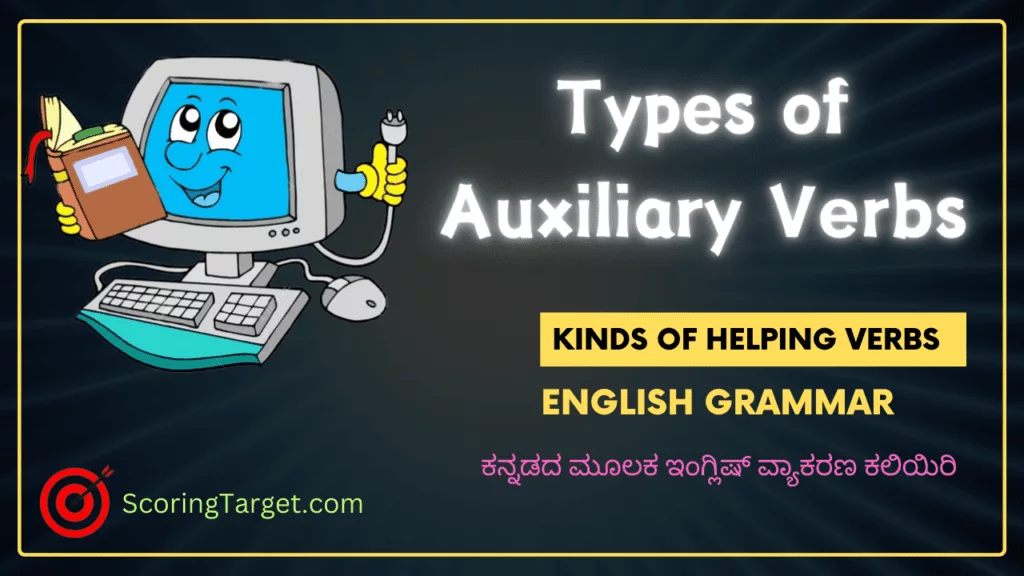Types of Auxiliary Verbs. Types of helping verbs in English grammar. Kinds of helping verbs and Kinds of auxiliary verbs. Types of helping verbs and examples in sentences.
Learn English grammar for high school students. We will learn Primary Auxiliary Verbs, Modal Auxiliary Verbs and Semi-Modal Auxiliary Verbs.
To get more videos on English grammar, visit our YouTube channel. This channel is very useful for all competitive exam preparation.

English grammar for high school students
Types of Auxiliary Verbs (Helping Verbs)
Auxiliary verbs, also known as helping verbs, are used with main verbs to form different tenses, moods, and voices. There are three main types of auxiliary verbs:
1. Primary Auxiliary Verbs:
2. Modal Auxiliary Verbs:
3. Semi-Modal Auxiliary Verbs:
1. Primary Auxiliary Verbs:
These verbs are used to form tenses, questions, negatives, and emphatic expressions. They include forms of “be,” “have,” and “do.”
Be form: (am, is, are, was, were, being, been)
Examples:
- I am happy.
- She is a teacher.
- They are playing outside.
- He was tired yesterday.
- We were at the park.
- She is being very helpful.
- They have been friends for years.
Have form: (have, has, had)
Examples:
- I have finished my homework.
- She has left.
- I have a new car.
- She has two siblings.
- We had a great time at the party.
- He is having lunch right now.
Do form: (do, does, did)
Examples:
Do you like coffee?
He did not come.
I do my homework every day.
She does her job well.
They did their best in the competition.
Have you done your chores?
Auxiliary verbs in English grammar with examples
2. Modal Auxiliary Verbs:
Modal verbs are used to express abilities, possibilities, permissions, obligations, and other conditions. They do not change form and are followed by the base form of the main verb.
Can: can, could
Examples:
She can swim.
He could finish it by tomorrow.
May: may, might
Examples:
You may leave now.
It might rain later.
Will: will, would
Examples:
I will call you.
Would you help me?
Shall: shall, should
Examples:
Shall we dance?
You should see a doctor.
You should stop eating fast food.
Must: must
Examples:
You must finish your work.
I must do my homework.
You must arrive on time.
Ought to: ought to
Examples:
You ought to apologize.
Three minutes ought to be long enough.
We ought to have locked the gate.
3. Semi-Modal Auxiliary Verbs:
Semi-modal verbs function similarly to modal verbs but are more flexible in form. They include expressions like “need to,” “have to,” and “used to.”
Need to:
Examples:
You need to study more.
I need to buy a new jacket.
Have to:
Examples:
I have to go now.
We have to clean our room.
They have to go to the doctor.
Used to:
Examples:
She used to play the piano.
Rajesh used to work for a large company.
These auxiliary verbs play a crucial role in forming various verb phrases that indicate different times, moods, and voices, making them essential components of English grammar.
Click to download Types of Auxiliary Verbs
Watch this video for the explanation of Types of Auxiliary Verbs.